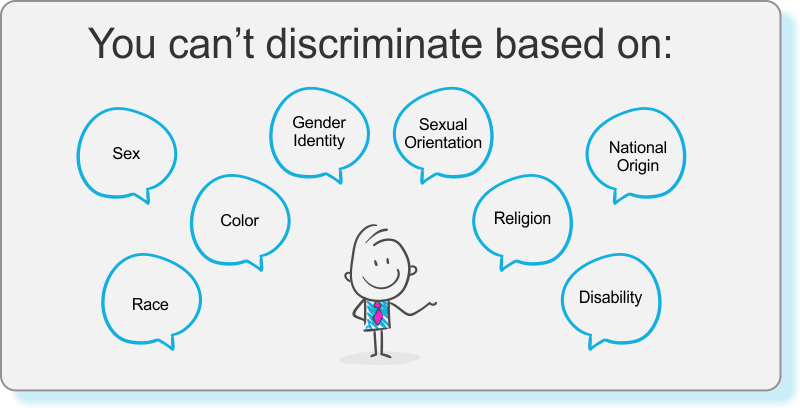Does Your Business Have a Right to Refuse Service?

It’s generally understood that there are legitimate reasons for a business owner to refuse service to a customer and that it’s within their rights to do so. In fact, you may have seen a sign at your favorite restaurant or retailer that reads, “we reserve the right to refuse service,” or “no shoes, no shirt, no service.” It all seems perfectly reasonable.
Furthermore, it’s socially acceptable that if a business applies its rules equally, it’s fine for them to refuse service for legitimate reasons.
This all adds up to the fact that a small business owner has the right to refuse service to customers for certain reasons. For example, no one would dispute a business can refuse service to an intoxicated patron who has become unruly and disruptive.
This really isn’t new stuff. What has changed in recent months are the emergency orders surrounding COVID-19, and this brings us to a new set of reasons that draw questions to the right an owner has to limit service.
So, let’s review when it’s OK and not OK to refuse service if you’re a small business owner.
When it’s not legal to refuse service
We just spent some time on the introduction saying it’s acceptable for a business to refuse service to a customer for legitimate reasons. However, not all reasons are legitimate, and therein lies the rub. When is it legitimate to refuse service?
This is likely easier to explain by touching on when it isn’t legal because there are some rules to all this madness. In fact, there are many anti-discrimination laws at the federal, state, and local level that control the right to refuse. The most familiar is the Civil Rights Act of 1964. That act forbids discrimination on the basis of race, color, religion, sex, or national origin in public accommodations. This means, no business is allowed to refuse a customer on the basis of their status or membership in one of these protected classes. Since the passage of the Civil Right Act, the precedent has extended the protected classes to include sexual orientation and gender identity.
This may seem clear enough, but legal challenges and other federal laws can expand protected classes. Additionally, while local and state laws and regulations cannot reduce federal rights, they can expand them. Below are two examples that modify protected classes:
- Bostock v. Clayton County:
In Colorado, the owner of a bakery refused to bake a wedding cake for a gay couple on the basis of his religious beliefs. At the time, the Civil Rights Act didn’t protect people on the basis of sexual orientation. However, Colorado’s anti-discrimination laws did. In 2018, however, the Supreme Court ruled in favor of the business owner. The decision was rendered in a way that the law ruling had little value as precedent, and in 2020, the Supreme Court ultimately extended Title VII protections to the LGBTQ community in Bostock v. Clayton County.
- Americans with Disabilities Act:
The Civil Right Act didn’t address protections for disabled Americans. As a result, lawmakers did in 1990 when they passed the Americans with Disabilities Act. This law prohibits discrimination against people with disabilities when it comes to employment, transportation, and public accommodations. Places of public accommodation include stores, theaters, restaurants, hotels, daycare centers, gas stations, and doctors’ offices.
Bottom line: discrimination laws can vary widely at the city and state levels, and new court cases can quickly change the protected classes or set a new precedent. This all makes it difficult for business owners to know where they stand. A good rule of thumb to apply before you refuse service to a customer, ask yourself if your actions could be misconstrued as a breach of discrimination laws. Below is a quick reference that can help you understand the current set of protected classes:

Your right to refuse service can lead to trouble
It’s pretty clear that most business owners don’t discriminate against protected classes. That’s good because discrimination against a protected class is a good way to get your business into legal trouble. However, in today’s climate, a perfectly reasonable refusal of service could spell trouble. That’s right. Even when you’re perfectly justified to refuse service, you may still end up in a legal battle.
Legal action could be costly and time-consuming, but that may not even be the larger problem that results from a refusal of service. In the court of social media, the rules are far less fair. A refusal of service can lead to harmful accusations of discrimination on Facebook or Twitter, online review sites like Yelp, or in blog posts – even if false. If the images, videos, or reviews go viral, the damage to your reputation and your business’s bottom line could be huge.
Before you refuse service to a customer or client, consider all the possibilities – even if you’re perfectly within your rights. It’s highly recommended that you only deny service as a last resort – when there is a legitimate threat to the health and safety of your customers and/or employees.
When can (or should) you refuse service?
Most businesses never have to deal with the decision to deny service or to turn someone away. However, the reality is that the need can arise for any business owner or manager who deals directly with the general public. So, you need to know a set of conditions or reasons when it’s legitimate to deny service and send a customer away.
Here are some scenarios where it is reasonable to deny service:
- Customers exhibiting rowdy, aggressive, or disruptive behavior
- Patrons who arrive outside business hours and refuse to leave
- Those who generally lack good hygiene or cleanliness
- Dress code violations
- Persons who threaten the health, safety or welfare of your employees or customers
Any time a customer’s actions create an unsafe or hostile environment, you’re within your rights as a business owner to refuse to serve them. However, that doesn’t mean you won’t face a lawsuit down the line.
How do you protect your employees and customers?
Business owners are always walking a narrow line between trade-offs and risk. The same is true regarding your denial of service. What policy can you employ that will simultaneously protect your customers, your employees, and your reputation? Well, we can’t answer that because it will be unique to each business. However, we recommend that you consult with a lawyer about the best practices regarding customer discrimination, state and local laws, and specific issues for your particular line of business before you develop a policy.
Additionally, you may also want to speak with an insurance agent to learn how small business insurance could help.
Pro Tip:
Your insurance agent can help you get employment practices liability insurance (EPLI) to cover third-party claims. EPLI insurance was originally created to protect employers from employee lawsuits over sexual harassment, discrimination, wrongful termination, and breach of employment contract, these endorsements can extend coverage to customer claims. Consult your insurance agent to see if you qualify for this type of coverage.
In the end, the best practice for avoiding legal trouble lie in creating a clear policy that you and all your employees enforce consistently. When you create a clear, defensible policy, include establishing clear rules for what’s expected at your business, and enforcing them consistently for all customers.
The bottom line
Customers may violate the rules you elect to enforce in your business, they may pose a threat to the well-being of others. If this happens, you’ll want to remain poised and politely explain why you won’t serve them, and ask them to leave. If they refuse, you should not elect to forcibly remove the patron or get into a heated debate, simply report the incident to law enforcement. They are better equipped to handle the matter. Make sure to immediately document the incident. In fact, over-document the details so that you have contemporaneous notes of the situation.
If possible, you should install video surveillance cameras with significant memory for retaining video evidence of incidents. This can provide value if you are asked to defend your actions.
Always remember, every time you refuse to serve a customer, you’re at risk of a lawsuit. While you have a right to refuse service, it should be a last resort – when there is a potential threat to the health and safety of your employees and customers.

Compare Business Quotes
Need new business insurance? Request a quote and we’ll shop the market for you, it’s free, fast, and reliable.
Give us a Ring
Call today and speak with a business insurance specialist.